Bad habits can seriously affect our career and relationships and keep us from living a healthy, happy life. However, understanding the psychology behind habit formation can help you get rid of bad habits and build better ones.
What Is A Bad Habit?
A bad habit is a negative behavior pattern that not only adversely affects our health but also damages our career, wealth, and even relationships. It is a patterned behavior that is caused by a lack of self-control and is detrimental to our well-being. Bad habits like smoking, drinking, procrastination, binge eating, and others can shatter our mental peace and happiness and drown our lives with excessive stress and anxiety.
“A bad habit can impede your happiness, health, and social relationships,” explains Susan Krauss Whitbourne, Ph.D., author and Professor Emerita of Psychological and Brain Sciences at the University of Massachusetts Amherst.
Related: 5 Bad Health Habits All Girls Are Guilty of And What to Do With Them
The Psychology Of Bad Habits
Most of us have at least one bad habit. But when it starts to affect your quality of life, then it’s time you do something about it. Melody Wilding, a performance coach and Human Behavior professor at Hunter College, writes “Whether it’s mid-day snacking, procrastinating, or skipping workouts, feeling powerless in the face of bad habits can really take a toll on your motivation, even your self-esteem.”
And despite our best efforts, we might not be able to break out of the toxic grasp of certain bad habits. This is why it is crucial that we understand the psychology behind habits to learn how exactly we can break them permanently.
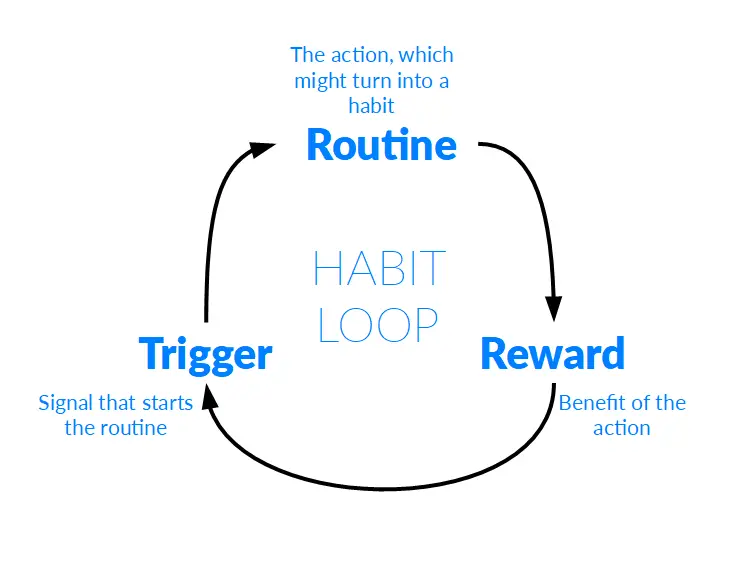
According to MIT researchers, every habit revolves around a neurological loop that includes 3 distinct parts. These include:
1. Cue/Trigger – External & internal factors which trigger the habit.
2. Routine – Engaging in the habit routinely.
3. Reward – The satisfaction of the craving provided by the habit.
The cue usually triggers a routine that leads to a temporary reward. It has been observed that the habit loop is wired into our psychology and is extremely powerful. Understanding the aspects of the habit loop can help us realize why it is so difficult to break bad habits. In fact, we can never actually break unhealthy and toxic habits, we can only replace them with newer, healthier, and more positive habits.
“To understand your own habits, you need to identify the components of your loops. Once you have diagnosed the habit loop of a particular behavior, you can look for ways to supplant old vices with new routines,” says Charles Duhigg, author of The Power of Habit.
Apart from these, different forms of conditioning of behavior can also result in the formation of good and bad habits. Classical conditioning, Operant conditioning, and Observational learning can strongly influence how we behave, act and live. These can also encourage us to build new habits or get rid of bad habits.
Related: 9 Surprising Benefits Of Bad Habits: The Lazy Person’s Guide
Stress And Boredom
Bad habits are often formed by a deadly combination of stress and boredom. It acts as a defense mechanism that allows us to cope with excessive stress or when we are too bored for a prolonged period. Every bad habit we tend to have, from wasting time on social media to drinking every day is our response to boredom and stress.
Working on the issues that cause stress and boredom can often enable us to become aware of our toxic habits, find better ways to deal with them and find healthier substitutes to break our bad habits. James Clear, the author of the New York Times bestseller, Atomic Habits, explains “Sometimes the stress or boredom that is on the surface is actually caused by deeper issues. These issues can be tough to think about, but if you’re serious about making changes then you have to be honest with yourself.”
How To Get Rid Of Bad Habits
If you are keen on breaking your bad habits and replace them with new, healthier habits to live a better life, then here are a few psychology-based ways to help you get rid of bad habits.
1. Identify the habit loop
Analyzing the habit loop and the cause of your bad habit is the crucial first step to breaking out of it. Be aware the next time you engage in your routine of the habit, focus on the cue that triggered it and the reward it provides.
Melody Wilding writes “Look at the circumstances surrounding the behavior including the time of day, who you’re with, and what emotions you’re feeling.” Make sure to write down your cue, routine, and reward every time to be able to diagnose it better.
Analyzing your toxic habits in detail will help you become increasingly aware of your bad habits and find helpful alternatives. “This awareness will transform your habit from an automatic, subconscious routine to a deliberate, conscious behavior,” explains an article on Medium.
2. Focus on the new, not the old
Most of the time, when we decide to break a bad habit, we tend to focus excessively on the routine itself which we need to stop. This immediately puts us into a negative frame of mind where we are constantly thinking about how not to think about the routine. And as a result, we end up thinking about the bad habit more than we do otherwise. This is why we often fall back to bad habits even after making progress.
According to an article published in TIME, research has revealed that when we try to suppress a thought or emotion, it becomes stronger and compels us to think about it. According to a 2008 study, resistance is directly linked to behavioral rebound. It found that people who tried to not think about eating chocolate actually ate more chocolate than others. Another 2010 study showed that smokers who tried to suppress their thoughts regarding smoking smoked even more.
Related: 5 Simple Habits That Will Make You A Creative Genius
What we need to do is shift our focus from negative goals to positive goals. So instead of telling ourselves what we can’t or shouldn’t do, we need to tell ourselves what we should or must do. So if you want to stop eating junk food, focus more on eating healthy and exercising than stopping your poor eating habits. This is one of the crucial ways to get rid of bad habits.

3. Look for better alternatives
Once you have figured out the cue, routine, and reward of your bad habit and built a positive frame of mind, explore healthier substitutes that you can use to replace your bad habits. Building new routines will empower you to accomplish your new goals. “Whatever it is and whatever you’re dealing with, you need to have a plan for what you will do instead of your bad habit,” writes James Clear.
“Create a list of options,” suggests Melody. It is important that you focus on building new routines that will enable you to “decompress after a stressful day (the cue) and leave you in a positive frame of mind to get freelance work done (reward),” she adds.
4. Set realistic goals
Another way to get rid of bad habits is to set clear goals. Instead of having a vague goal, like eating healthier, focus on building specific, realistic goals that you can actually achieve. Think about what exactly you want to eat to get healthier, for instance. Research online and create a diet chart or visit a nutritionist for some professional help.
Creating realistic and specific goals will help you take effective action that will ensure you build a new healthier habit in the long run. Susan Krauss Whitbourne, Ph.D. writes “Decide on a realistic schedule that will work for you based on goals that you believe you can meet.”
It is also important that you do not judge your decisions or efforts based on your past situation of failures. Professor of psychology at Stanford University, Russell Poldrack, says “Habits are an adaptive feature of how the brain works.” He adds “It’s always going to be easier to react based on something you’ve already planned out in the past versus trying to come up with a new plan on the fly.” This is why you must plan out how exactly you will build your new habits and develop the right mindset.
Related: If You Have THESE 3 Bad Habits, You Might Be Exceptionally Intelligent: Studies Say
5. Remove triggers
Eliminate as many triggers from your life as possible. Stay away from people, situations, and things which may trigger your bad habits. Get rid of all the alcohol, stay away from the bar, avoid smoke breaks, throw away the candy bars, do whatever you need to. But make sure to cut out the triggers so that you can successfully build a newer habit that’s healthy for you.
James Clear writes “Make it easier on yourself to break bad habits by avoiding the things that cause them.” This is a crucial stage to help you get rid of bad habits.
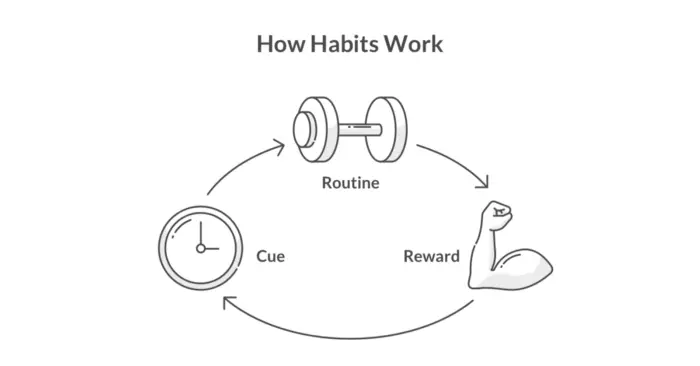
6. Change your environment
An excellent way to get rid of all triggers is to change your environment and move to a new one. Our environment greatly influences our lifestyle and habits. By drastically changing the environment we live in, we can get out of the autopilot mode that supports our bad habits and build a new routine in absence of the cue. James adds “Your environment makes your bad habit easier and good habits harder. Change your environment and you can change the outcome.”
In fact, research shows that moving to a new environment can help to change habits as we are not exposed to familiar triggers. Dan Ariely, author, and James B. Duke Professor of psychology and behavioral economics at Duke University explains “If you move to a new place, you won’t have all of these environmental cues. If you take advantage of a time when you go on vacation, or when you do something else for a few weeks, those are really good times to break a habit.”
7. Be patient
It is highly likely that your bad habits have formed over a period of time and not in just a few days. Similarly, it will take adequate time to form a new healthy habit as it requires a lot of dedication and commitment. Susan Krauss Whitbourne, Ph.D. explains “It’s unlikely you can change completely right away if this is an ingrained habit reinforced by others and caused by some self-defeating tendencies.” So “you’re not going to throw them off in an instant,” she adds.
In fact, according to a 2010 study titled ‘How are habits formed: Modelling habit formation in the real world’ published in The European Journal of Social Psychology, on average it usually takes 66 days to change a specific behavior. However, the time period can vary from 18 days to 254 days. So it is imperative that you remain patient and focus on progressing in a slow and stable manner to get rid of bad habits.
Related: STOP Killing Your Self-Esteem: 5 Habits You Need To Change Now
8. Share your goals with others
If you want to get rid of bad habits, then tell others about it. Sharing your goals with your family and friends can prove to be highly beneficial for changing your bad habits permanently. “When we tell others about a goal and we do not follow through on it, we are ‘punished’ with shame and a feeling that we let other people down,” explains Kauser Khan, a clinical hypnotherapist and homeopathic practitioner.
Although shame should not be a motivator, in this case, it surely is effective. By informing our friends and family about our goals to change bad habits, we become more likely to follow through on them. As we don’t want to seem like a failure, we give our best to break our bad habits.
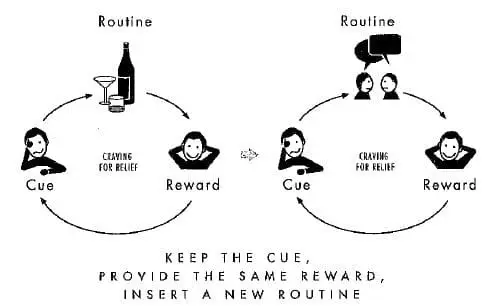
According to a 2019 study by Ohio State University, sharing our goals with the right person can help us achieve them. The researchers discovered that our commitment and performance towards achieving a goal increase manifold when we share it with someone we look up to, someone we believe has a higher status than us.
Howard Klein, the lead author of the study and professor of management and human resources at Ohio State University, says “Contrary to what you may have heard, in most cases you get more benefit from sharing your goal than if you don’t – as long as you share it with someone whose opinion you value.” He adds “You don’t want them to think less of you because you didn’t attain your goal.”
9. Expect setbacks
If you want to get rid of bad habits, then it won’t be easy. If you are expecting a smooth ride, then you are in for a shock. “No one is immune from the occasional slip-up, so when this happens, don’t beat yourself up or retreat into negative self-talk,” explains Human Behavior professor Melody Wilding.
The only way to solidify your habit loop is to expect setbacks and effectively plan for them. Moreover, it is also important that you do not give in to negative self-talk. Tell yourself that it’s okay to slip up a few times as long as you are focused on achieving your goal in the long run. “If you use that slip as ‘proof’ that you can never change, you will in fact not be able to change. Instead, try to figure out why you slipped,” adds Susan Krauss Whitbourne, Ph.D., Professor Emerita of Psychological and Brain Sciences at the University of Massachusetts Amherst.
Related: 7 Mental Habits That Make You Feel Bitter With Time
Time For Change
Now that you know about the psychology of habits and how to get rid of bad habits, it is time you get started. However, remember that it all starts with awareness. By being aware of your own negative habits and behaviors, you can achieve great success in removing them from your life.
Of course, it will be difficult and take a lot of time to change a bad habit completely. However, if you are determined to get back up after every time you fail, you can manage to turn your life around and be healthier and happier. Bestselling author James Clear concludes “You might not have success right away, but that doesn’t mean you can’t have it at all.”
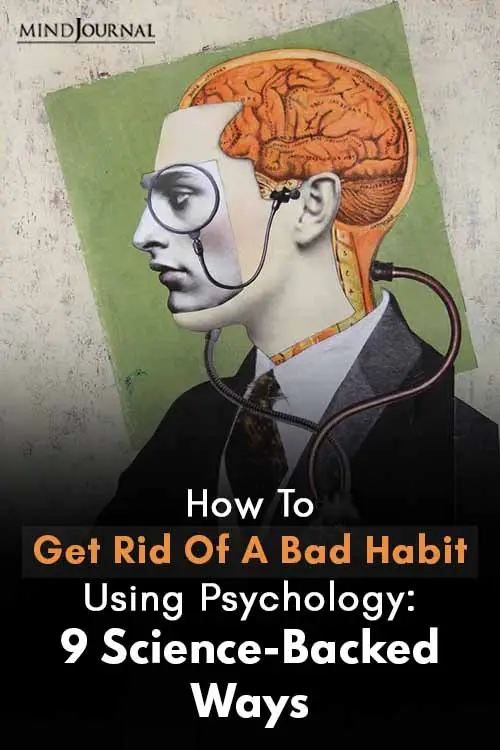
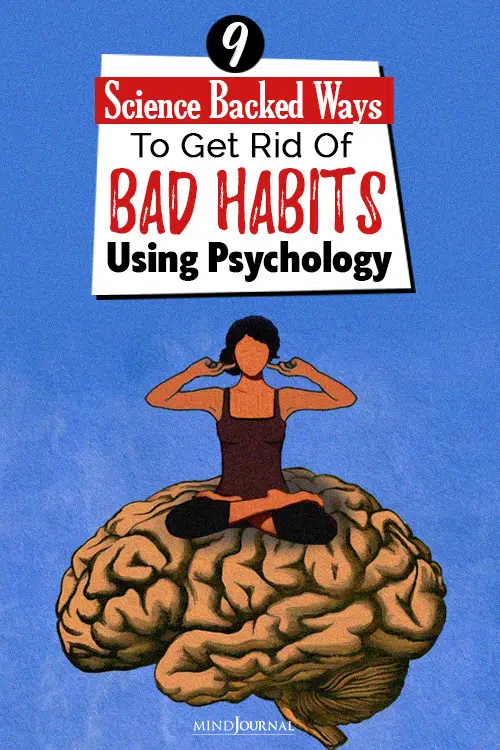
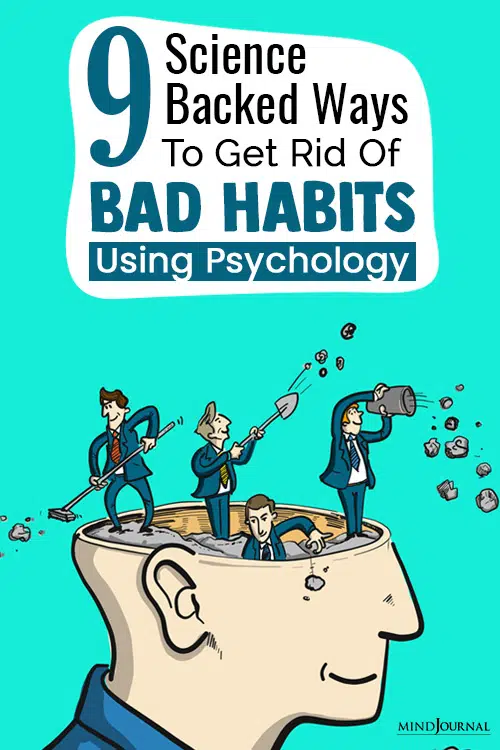
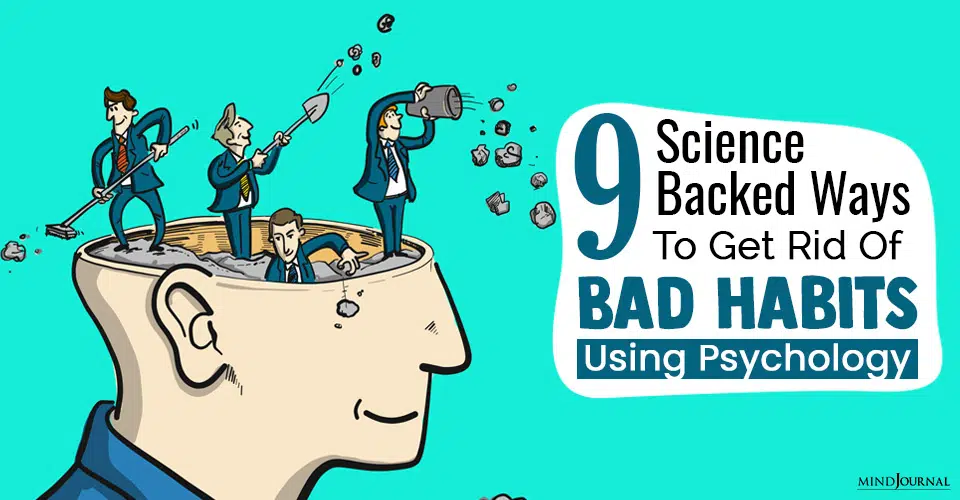







Responses
Thanks